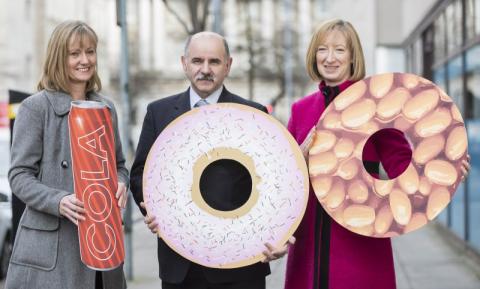New campaign: eating extra will add extra on

On this extra day of the leap year, the Public Health Agency (PHA) is launching a new obesity prevention campaign making people aware of the consequences of eating ‘extras’.
A new TV ad will be on our screens from tonight showing how eating just an extra 100 Calories each day more than your body needs – around one and a half digestive biscuits or just six extra chips – could add up to 10lb of weight gain per year, impacting on your health and wellbeing.
To see the ad click on www.choosetolivebetter.com
In Northern Ireland, 60% of adults are either overweight (35%) or obese (25%).
Dr Eddie Rooney, Chief Executive of the PHA, said that the campaign is about shifting our attitude on how we eat: “We probably don’t even realise the extras that we eat each day and how easy it is to eat too much. The snacks, nibbles and second helpings are things we tuck into without even thinking, but every extra bit that goes in, ends up going on.
“It’s important for us to think before we eat, and understand how even making the small change of saying no to the extras can have a positive impact on our health.”
On average, a man needs a healthy, balanced diet with around 2,500 Calories a day to maintain his weight. A woman needs a healthy, balanced diet with around 2,000 Calories a day to do the same.
Dr Tracy Owen, Consultant in Public Health Medicine at the PHA, said that when you see what 100 Calories looks like, you will be surprised: “It’s the everyday habits of eating a few sweets, or an extra forkful of pasta left on the kids’ dinner plates, that we never think of as having any impact. But those small things can add up, so by making a decision to eat a little less, we can take more control and improve our health and wellbeing.
“Combining healthier eating habits with being more active, like going for a walk at lunchtime rather than sitting at your desk at work, can combat the risk of those extra pounds. Maintaining a healthy weight can reduce your risk of developing a range of chronic conditions such as heart disease, some cancers and Type 2 diabetes.
“Three-fifths of adults here are overweight or obese. That figure has remained much the same over the past 10 years and now we want to see that number fall.”
Here are some examples of what 100 Calories looks like:
- Three and a half cocktail sausages
- 13 peanuts
- One thick slice of bread
- One and a half digestive biscuits
- Two and a half rich tea biscuits
- One and a half custard creams
- One tablespoon of mayonnaise
- A forkful of spaghetti
- Half a scone
- Six oven-baked chips
- One potato waffle
- Two fish fingers
For all the information you need on what 100 Calories looks like, tips and advice on portion size, and moving more, visitwww.choosetolivebetter.com
ENDS
Notes to editors
- The Public Health Agency’s ‘Extras’ advert will be broadcast on TV and social media throughout the month of March.
- A short audio clip with the Public Health Agency's Health and Social Wellbeing Improvement Manager, Angela McComb, can be accessed at https://audioboom.com/boos/4232370-26-02-2016_11-10
- The values of recommended total daily Calorie intake can vary depending on age, metabolism and levels of physical activity, among other things. More info on this can be found at www.nhs.uk/chq/pages/1126.aspx?categoryid=51
- Stats from the 2014-15 Northern Ireland Health survey show that 60% of adults were either overweight (35%) or obese (25%). Over a third of adults (38%) were classed as being of a normal weight with the remaining 2% classed as underweight.
- The percentage of adults classed as obese or overweight has increased from the level reported in 1997 (56%), although has remained at a similar level since 2005/06 (59%).
- The NI Health survey 2014-15 can be found atwww.gov.uk/government/statistics/health-survey-northern-ireland-first-results-from-the-201415-survey
